Eric Martin of Mr. Big
by Alissa Ordabai
Staff Writer
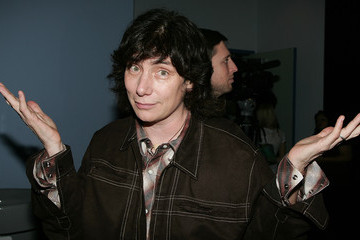 Fluid yet tight, sleek but full of roiling rock intensity – Mr. Big’s new record “What If” released earlier this month is perhaps the band’s most self-assured album to date. Proving that the supergroup’s 2009 reunion after 7 years apart is more about looking into the future than getting nostalgic about the past, the band packs its new release with instant-grip aural blusters that are both non-obsessive and vigorous. Sounding more dynamic, confident and at ease with themselves than ever before, they boldly show how rigor of purpose and inspiration can coincide to help a veteran band open a new chapter.
Fluid yet tight, sleek but full of roiling rock intensity – Mr. Big’s new record “What If” released earlier this month is perhaps the band’s most self-assured album to date. Proving that the supergroup’s 2009 reunion after 7 years apart is more about looking into the future than getting nostalgic about the past, the band packs its new release with instant-grip aural blusters that are both non-obsessive and vigorous. Sounding more dynamic, confident and at ease with themselves than ever before, they boldly show how rigor of purpose and inspiration can coincide to help a veteran band open a new chapter.
But despite the freshness of the new record’s sound, a sense of continuity is also inevitably there. The band’s phenomenal chops are as mind-blowing as ever, and the songwriting does not shy away from reincarnating the glorious good-time vibe they have managed to capture so flawlessly in the late Eighties. After all, this has always been a light-hearted, exuberant band, and they stick to this approach with great poise.
If anything, “What If” truly is entertainment galore: guitarist Paul Gilbert is playing more swaggeringly flash leads than ever before, the rhythm section is the same high-voltage multi-layered powerhouse of Billy Sheehan’s bass extrapolations and Pat Torpey’s cookin’ drums, while Martin himself spans a wider emotional range than on any other Mr. Big album.
On “Nobody Left to Blame” – an intense stomper centered around a Jimmy Page-inspired groove – Martin’s richly detailed earthbound delivery is artfully juxtaposed against soaring, transparent vocal heights – to a rich, complex emotional effect. But as if to expand the ground he lays claim on further, another standout – “As Far As I Can See” – highlights yet another side to his character. Here his voice is full of authority and a deep sense of purpose – incisive, focused, and unassailable. The band’s modus operandi may stay the same, but there is a heightened sense of elegance and dignity to how they now present their formulas.
This vividness of detail is largely down to producer Kevin Shirley’s spare and laconic approach, which allows the crisp nuances stand out against the band’s dense, tight, but also highly textured sound. With Mr. Big – unlike so many other bands – this whopping wall of sound is down to pure instrumental skill and chemistry – not studio layering – and Shirley preserves this natural synergy of its players with shrewd understanding of what has always been one of the best features of this act.
The recording process and the creative impulse behind the new release, as well as observations on how it feels to be reunited with one of the greatest bands on today’s rock scene, became some of the topics of our recent interview with Eric Martin. Fun, spontaneous, and frank, Martin confirms once again that with all great singers words automatically ring true when they come from sensation and experience – only this time in an interview, not on stage.
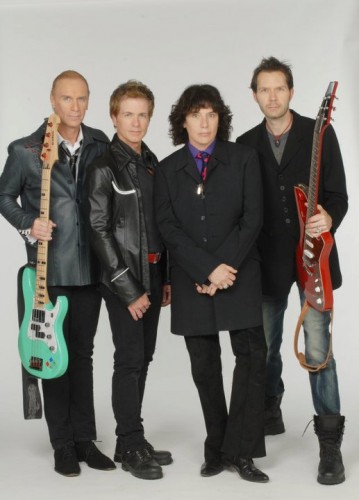 Hardrock Haven: Eric, thank you for agreeing to do this interview with us, we really appreciate your time.
Hardrock Haven: Eric, thank you for agreeing to do this interview with us, we really appreciate your time.
Eric Martin: Sure.
HRH: The first thing I’d like to say is congratulations on the new Mr. Big album.
EM: Yeah, I can’t believe that we actually got that far!
HRH: I have to say- what a fantastic record.
EM: Oh, right on, thank you.
HRH: It seems like this is the most self-assured Mr. Big album to date. So full of energy, yet so fluid, and so tight, and such a great balance of energies.
EM: Well, that’s it! Right! Thank you so much, and you can tip the waitress on the way out! I appreciate it!
HRH: Ha-ha! But you were saying in other interviews that writing it was an easy, natural process, and the album was recorded in two weeks.
EM: Yes, it was easy (laughs) but it was like being thrown into a snake pit.
HRH: Oh.
EM: It was easy because fifteen years… I’m sure I came up… I should have come up with a lot more material. Even when Mr. Big was broken up every time I wrote something and I showed it to record execs and my songwriting partner, going, “What do you think of this?”, they’d say, “Sounds like Mr. Big.” So after fifteen years I’ve accumulated a few songs, but I have narrowed it down to the best nine I could think of. And when I showed them to Mr. Big, they didn’t like any of them. (Laughs).
HRH: Oh, no!
EM: That was kind of funny. (Laughs). No, they really liked like three songs, and those were the three that made it. It was easy for me because I was so excited with the band back again and (adopting an exaggerated Southern twang) the creative juices just ran down my leg, it was all good!
HRH: Ha-ha!
EM: I know this sounds disgusting, but anyway.
HRH: Sounds like Robert Plant.
EM: Yeah, it was creative lemon juices. But a week before we recorded I wrote one of the songs that was called “I Won’t Get in My Way”, and it did feel simple because everything in my life after Mr. Big seemed really hard. I was like, “Oh now what do I do?” But when Mr. Big got back together, I realized, “Man, this is the best band in the world for me!” It’s the only greatest band you’ll ever be in, so… Songwriting-wise it became easy and fun.
HRH: Do you think this time around it was all about experience and all the band members being in the right frame of mind for it, or is there such thing as spontaneous magic that was at work here? If there is such a thing.
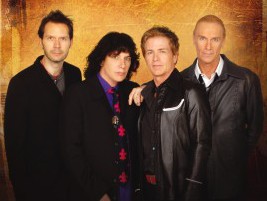 EM: God, I don’t know! I don’t know who to thank – god, spontaneous magic? I don’t really know. I think time definitely helped a lot. I mean, look, I’ve said this before and I’m saying it now – that after four or five years you kind of lose taste for hate. The rest of the guys in the band – I don’t know what they were thinking or whatever – but after five or six years, especially when we’ve broken up until now, in every interview, and every fan that has come up to me, have always asked that question, “Hey, when Mr. Big is going to get back together?” You know? And so I started realizing what I missed – the great talented musicians, and just even the spark that we used to have on stage. And I forgot about all the bad sparks that we used to have off stage. And yeah, it seemed like a simple answer, but I really missed the old guys.
EM: God, I don’t know! I don’t know who to thank – god, spontaneous magic? I don’t really know. I think time definitely helped a lot. I mean, look, I’ve said this before and I’m saying it now – that after four or five years you kind of lose taste for hate. The rest of the guys in the band – I don’t know what they were thinking or whatever – but after five or six years, especially when we’ve broken up until now, in every interview, and every fan that has come up to me, have always asked that question, “Hey, when Mr. Big is going to get back together?” You know? And so I started realizing what I missed – the great talented musicians, and just even the spark that we used to have on stage. And I forgot about all the bad sparks that we used to have off stage. And yeah, it seemed like a simple answer, but I really missed the old guys.
HRH: What do you think is the secret behind the longevity of Mr. Big? Because most so-called super-groups disband pretty fast. What is the secret behind being able to balance each individual talent and ambition in a situation where every band member is a star on their own right?
EM: I think it’s respect and patience and. Back in the day and even now we’ve always been motivated by making things work, and keeping up our chops. I think everybody’s got really huge talent here. I don’t know what it is, but we definitely have some kind of cool chemistry.
HRH: You’ve just mentioned chops, and it’s always been an important aspect in Mr. Big. But has anything on the new album challenged you as a singer?
EM: On this album?
HRH: Yes.
EM: I think this one was a really corky album to make for me because on all the other records I’ve ever done I’ve done a guide vocal and then sat down for two weeks and watched the other guys have all the fun. And I’ve never had a great studio experience. When I went out there, I would sing for ten days or something like that and it would be over. Nobody would be there in the studio, it’s like the party is over and I am the clean-up girl. But this time the producer, Kevin, made me stay there with the guys. And even the guys were looking at me like, “Hey, this is not how we work – Eric singing all over the place and stepping on us,” which is funny. The whole thing challenged me. It took two weeks and it felt like a little mini-tour because he had us in there singing like 15 or 20 takes of one song, and then, if we had a problem with it – not just me, but anyone – there was no fixing it later. “If you want to do it again, ask your brethren.” Like Frank Sinatra style – you got a oboe player who missed a cue and everybody has to do it over again – there is no cut and splice the tape kind of stuff. That to me was a challenge. I kept saying, “Oh, man, my throat kind of hurts after two or three days of singing sixty takes for only two songs.” And he says, “OK, take a little break, but I want that first impression.” That’s what he was looking for. Like with an audience member – the first thing you sing – that’s it, that’s what he wanted to hear: “I don’t want to hear you fixing it or Pro-Tooling, I want that sandpaper voice of yours, I want the gravel.”
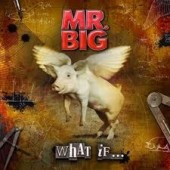 I look at this record as kind of a gig. When I first started singing I was singing really high. Every time they say to a singer, “You gotta pace yourself,” god, I never paced myself! I’m an idiot. (Laughs). I’d come out there and sing, and then two or three songs into this project my voice went gravelly, and then three, five or more songs I’m kind of straining a little bit, but it’s a genuine emotion – reaching for that brass ring kind of thing. And he wanted all of that. The whole record was like being thrown into a lion’s den because I couldn’t leave out of my little teeny booth I was in. And another thing – the whole band together was in one room the size of a garage, or a garage and a half, and he made us stay in a room and was kind of pushing us: “Give me more!”, even though part of one of the songs – “Nobody Left to Blame” – this kind of Pink-Floyd-ish part in the middle, or Led Zeppelin-esque part in the middle…
I look at this record as kind of a gig. When I first started singing I was singing really high. Every time they say to a singer, “You gotta pace yourself,” god, I never paced myself! I’m an idiot. (Laughs). I’d come out there and sing, and then two or three songs into this project my voice went gravelly, and then three, five or more songs I’m kind of straining a little bit, but it’s a genuine emotion – reaching for that brass ring kind of thing. And he wanted all of that. The whole record was like being thrown into a lion’s den because I couldn’t leave out of my little teeny booth I was in. And another thing – the whole band together was in one room the size of a garage, or a garage and a half, and he made us stay in a room and was kind of pushing us: “Give me more!”, even though part of one of the songs – “Nobody Left to Blame” – this kind of Pink-Floyd-ish part in the middle, or Led Zeppelin-esque part in the middle…
HRH: … and you sound kind of bluesy on it.
EM: Yeah, I wasn’t even doing anything, and Kevin was like, “Hey, what are you doing?” Looking at me, saying, “What you just did in there? Give me something!” You know? Anyway, he was part slave driver and part cheerleader.
HRH: Speaking of which, do you think there have been any major changes in the way rock singers see their profession now compared to the time when you were starting out? Because your style is influenced by rock singers, and soul singers, and blues singers, while these day rock singers don’t look that far back. Would you agree with that?
EM: I like to think that with rock singers today maybe I’m the guy they look into. Or maybe some of the people that I grew up with, like Jeff Keith from Tesla. Maybe they are looking at these guys. I don’t really know about the new rock singers. Are there new rock singers? Yes, there are new rock singers! But I don’t know where they get… They are all saying they get it from the classic rock singers and stuff like that. It’s funny – when I hear people doing interviews, everybody says pretty much the same thing. They kind of all… It’s a great pot of gold to get music from and get ideas from. (Laughs). All the classic rockers and people I was influenced by – Otis Redding, Wilson Pickett, Sam Cooke, all that stuff. That music is still alive, and they are probably going back and listening to it. For me – I was there watching the Beatles on Ed Sullivan, I can’t say the same for the new kids on the block.
HRH: I think you did influence people because somebody mentioned to me just the other day how they thought Ritchie Kotzen was using musical knowledge received while in Mr. Big on his solo records, specifically in terms of vocals.
EM: Wow!
HRH: And it’s interesting – the sense of continuity, passing on the musical knowledge in this band.
EM: God, I didn’t think he was listening to me!
HRH: Some people think that he has.
EM: There’s something I’ve learnt from Richie Kotzen as well. I really liked playing in a band with him. The kid is a star, I love everything about him. Even like… He’s such a pirate, he had this kind of swagger, this nonchalant vibe to him. Everybody in the band was taken by this guy. Brilliant guitar player. So much soul. But his voice carried. I had this idea where I went, “I have no problem, there is no jealously or anything like that, but I think we have to sing together more,” like some Sam and Dave vibe in this band. Anyway, Richie Kotzen is doing great, and I’m glad if he got a piece of musical knowledge from the old guy in the band.
HRH: Ha-ha, “the old guy”!
EM: That’s how I feel! If anybody took anything, then I’m honored.
HRH: In terms of taking this record on the road, I know you have Japanese dates scheduled for April, but do you have any plans to tour this record in Europe?
EM: We do, actually. Some dates are coming in. Like you said, Japan and South-East Asia, and we’ll be going to China, but we are playing a handful of festivals in Europe. And you know what, there is actually some stuff coming in – Germany, the Netherlands, Italy, France.
HRH: How about the UK?
EM: Just the Download festival right now.
HRH: Oh, wow! Great.
EM: I looked at the bill, and our manager goes, “Look who you’ll be playing with – Maiden, Priest.” And we go like, “Holy ***, really?!” And I look at the poster and it’s like massive, and there’s Mr. Big somewhere in the middle. Way down, tiny font. (Laughs). But at least we got there, man!
HRH: Yeah, absolutely.
EM: I gotta tell you something. I was just thinking about this the other day. When I was younger, (switching to the Southern twang) and I don’t know how old I was, something like in my 20s – (Laughs) – I went with Neal Schon from Journey to meet up with John Entwistle.
HRH: Really?
EM: This is not like a new Wizard of Oz twist, trust me. This really happened.
HRH: OK.
EM: Me, and Neal, and John went into this house, a castle kind of thing, and we were thinking about starting a band, doing demos and stuff. So on a break we went to Donnington Festival, the original Monsters of Rock. And it was an amazing day. A hotel like a Holiday Inn was really close to the place, and all the bands – Van Halen, AC / CD, everybody was hanging around and drinking in the bar.
HRH: Incredible.
EM: Fist time in England I had to have something. I’ve had something, I don’t remember exactly what, but it was something. It was an amazing day – hanging at the festival and then being on stage watching Van Halen do their thing. And in the back of my head I’m thinking, “God, I want to be doing this!” And it’s a cliché, everybody wants that big prize, like, “I’m gonna be here one day, this is what I want! I want to be David Lee Roth talking to the audience!” I didn’t want to be David Lee Roth, but… And it only took 27 years, but I’m back! (Laughs).
HRH: We are running out of time, so I have one last question. It’s a bit goofy, but I hope you don’t mind.
EM: Oh no, goofy is good.
HRH: Great, I’ll give it a go then. If you were given a true answer to any question in the Universe, what would you ask?
EM: And who am I asking the question?
HRH: The universal mind that has all the answers to all the questions.
EM: My question would be… This is depressing actually… “What are you killing us for?” I would say, “Why are you killing us?”

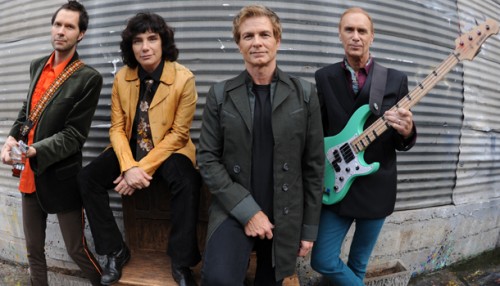
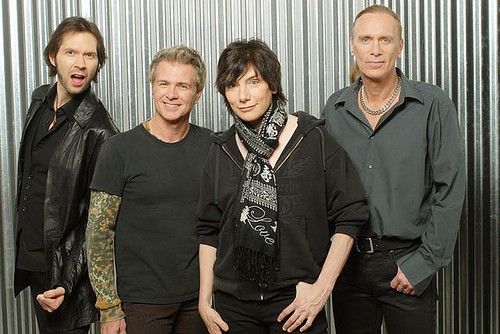
mr big rocks their songs are rocking and hardrock music of the 80s 90s rocks